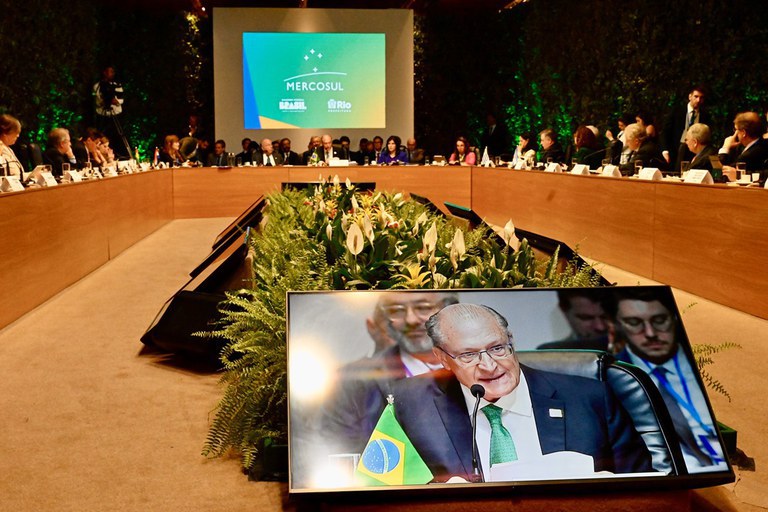Notícias
FOREIGN AFFAIRS
Alckmin: Bolivia's Entry and Trade Agreement with Singapore Expand Investments in Mercosur

- Credit: Cadu Gomes/VPR
During the opening of the Mercosur Common Market Council meeting on Wednesday, December 6, in Rio de Janeiro, Vice President and Minister of Development, Industry, Trade, and Services, Geraldo Alckmin, emphasized that the signing of the Mercosur-Singapore agreement and Bolivia's entry into the economic bloc will broaden investments and trade in the region.
This integration strengthens economic ties between Brazil, Mercosur, and the Asian region, creating opportunities for greater diversification of exports and investments"
Geraldo Alckmin, Vice President and Minister of Development, Industry, Trade, and Services
"The Mercosur is growing and reaffirming itself on the international stage. The Brazilian Congress has just approved Bolivia's entry into the bloc, allowing for more trade, more investment, and more joint development," stated Alckmin. The Vice President noted that Bolivia's accession creates an even more significant space for regional integration and possibilities for shared development.
Foreign Minister Mauro Vieira recalled that during Brazil's 'pro tempore' presidency of the bloc, technical discussions continued on the agenda for the incorporation of norms by Bolivia. This will serve as a basis for the progressive integration of the Bolivian government into the Mercosur forums restricted to member states.
"The expansion of our bloc, which, I must emphasize, still depends on the approval of the Accession Protocol by the Bolivian Legislative branch, is a sign that we are moving in the right direction," declared Vieira at the meeting.
SINGAPORE — The signing of the free trade agreement with Singapore is expected during the Mercosur Leaders' Summit on Thursday, December 7. It marks Mercosur's first agreement of this kind in over ten years and the first with an Asian country.
The treaty involves goods and facilitates investments, technology flows, services, movement of people, and legal security. Alckmin highlighted that the agreement is the gateway for Mercosur members (Brazil, Argentina, Uruguay, and Paraguay) to Asia and the Association of Southeast Asian Nations (ASEAN).
"This integration strengthens economic ties between Brazil, Mercosur, and the Asian region, creating opportunities for greater diversification of exports and investments," emphasized the Vice President.
According to the Minister of Foreign Affairs, the agreement represents a significant advancement for the bloc and a milestone in the extra-regional agenda. "It is an agreement in which trade in services and the exchange of investments play a central role. It is only natural: in 2022, Singapore was the third-largest destination for foreign investments globally, while Brazil ranked fifth. Singapore was the 11th largest emitter of investments globally," he pointed out.
INTRAREGIONAL TRADE — Alckmin recalled that together, Mercosur countries form Brazil's fourth-largest trading partner, and about 80% of the export trade is in manufactured and semi-manufactured products. "Our partners in the bloc are essential to the neo-industrialization project," he said.
"The world is globalized, but trade continues to be mainly regional. The density of intrablock trade is a sign of progress in integration. In the European Union, about 60% of trade is intrablock. In Mercosur, it is only 10%. Intrablock trade has been growing, but we need to change this scenario," argued Alckmin.
EUROPEAN UNION — The Vice President also highlighted significant progress in negotiations between Mercosur and the European Union, with commitments from both sides for a balanced understanding in the near future, based on solid foundations built in recent months of intense engagement.
Minister Mauro Vieira stated that there is an expectation for the signing of the Mercosur-EU agreement shortly. "There are gains to be made for the Mercosur economies in the European market, both to expand exports and to acquire technologies that will enhance our competitiveness," he concluded.